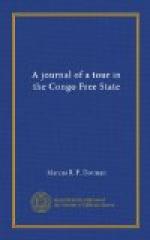seventy or eighty marched with reversed arms to the
cemetery after the buglers sounding the Last Post
and lined up opposite the grave. The order was
given to present arms, the coffin was lowered, each
person present threw a handful of earth into the grave
and all was over. Far into the night, however,
one could hear the mournful dirge the soldiers were
chanting for their dead comrade. Hunting here
is difficult although game abounds, the grass being
high enough to conceal antelopes and everything else
except elephants. After a walk through rough country
and water for six hours without success, I was glad
to get into my hammock and was jogged back home by
perspiring natives, who took turns to carry their
burden and changed about every ten minutes. Altogether
the hammock is not comfortable, and it is obviously
useless hunting here until the grass is burnt.
Next day, being very tired and stiff, I pass the time
looking through
Civilisation in Congoland again.
Having now visited many of the places mentioned in
that book, the difficulties which beset a writer who
publishes a work on a country he has never seen, become
very apparent. In fact, it gives no more idea
of the condition of the Congo than a file of the Police
News would convey an impression of English civilisation.
When one has visited some hundreds of villages and
seen perhaps a million of natives, most of whom seem
cheerful and contented, one marvels indeed how such
absolutely false reports of the condition of the country
can have originated. On the other hand, it is
impossible to travel several thousands of miles in
the Congo—especially in the unfrequented
parts—without constantly wondering what
is the extraordinary power which enables a few hundred
white men, not only to govern as many million blacks,
but to open up and develop a country as large as the
continent of Europe, which a few years ago was absolutely
unknown.
We can dismiss at once the idea that the native is
suppressed by military despotism, for the Posts are
isolated and the number of troops in them merely sufficient
to guard property and stores, that is to say, to fulfil
the duties of policemen in England. At any moment
the thousands of natives who live in or near the Posts,
could overwhelm these small forces long before help
could arrive from the next Government Station, in
many cases a week’s journey distant. The
fact that they do not do so, is at least negative
evidence that the white men do not ill treat the people.
There is however, much positive evidence that the
native has, not only a great respect, but also an affection
for his new rulers, and it is not difficult to understand
the reason, when we compare his fate before the advent
of the Europeans with his condition at present.




